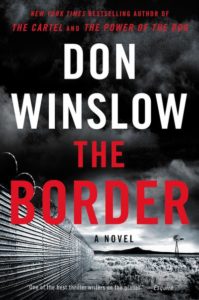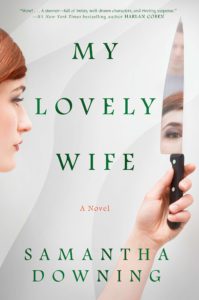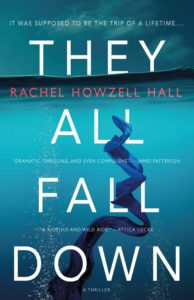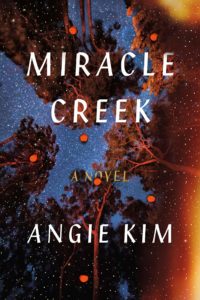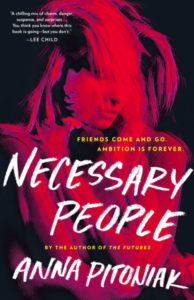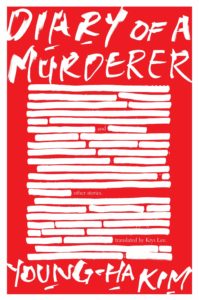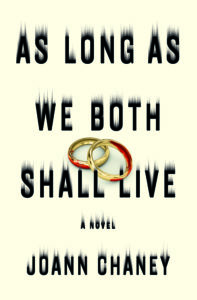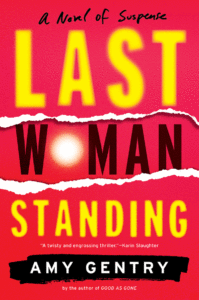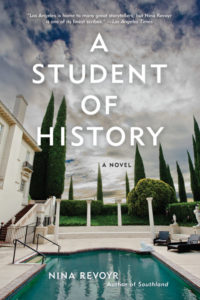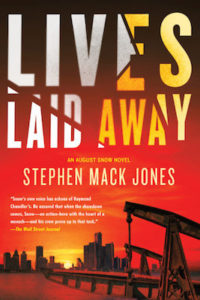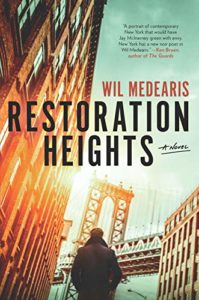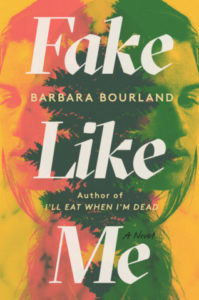The Summer Solstice has come and gone, which means it’s time, dear readers, to make a quixotic attempt to distill the many hundreds of quality crime novels already released this year down to the very best. Think of this as a snapshot—each list that claims to be the “best” of anything carries with it a knowledge of its own fleeting relevance, soon to be supplanted by further lists that claim they, in fact, contain the best of said month/year/decade/era. But already we can see certain themes for the 2019 based on what’s connecting with readers so far. It’s a been a year defined by innovative espionage fiction, epic reckonings, brutal historicals, bleakly cynical noir, much-needed rewrites of problematic classics, and plenty of slow-burn suspense. The landscape of crime fiction in 2019 is dark, relevant, experimental, playful, cynical, and urgent. To call these highlights would be to miss the point of our dark times—instead, perhaps, let’s call them clearsighted, uncompromising, and deeply humanist.
Lauren Wilkinson, American Spy (Random House)
While many of us might be inspired by classic espionage fiction to imagine the work of American spies abroad as glamorous, or at least not soul-sucking, Lauren Wilkinson’s American Spy is more along the lines of what to expect from the realities of American espionage. A young woman stymied in her government career by institutional racism takes an assignment to spy on the left-leaning president of Burkina Faso, and finds herself torn between ambition and justice, the personal and the political, and what is, versus what could be.
Don Winslow, The Border (William Morrow)
The finale to Winslow’s narco epic series does not disappoint. The Power of the Dog (2005), The Cartel (2015), and now The Border (2019) make up one of the most ambitious works in modern crime fiction, an epic narrative of the ill-fated War on Drugs and an achievement that rivals Ellroy’s history of the Los Angeles underworld. The Border goes as far as any work of fiction can in explaining how we’ve reached the current quagmire: a region engulfed in violence, the spread of an opioid epidemic, the militarization of police forces across the Americas, and the rise of opportunistic political regimes that capitalize on the suffering. Winslow also delivers on the human moments, with aching portraits of the war’s victims: a young boy from a tough Central American capital, making his way north on the train known as La Bestia; addicts on Staten Island; undercover agents putting in years to make cases, only to see their work bartered away. It’s an astonishingly rich mosaic of humanity.
Samantha Downing, My Lovely Wife (Berkley)
There’s been a recent trend of mysteries emphasizing the culpability of the enabler: those who know and do nothing, no matter what sounds they hear in the attic or coming from the basement. And there’s another new trend that looks at those who do more than just enable their partner’s violence: they participate in it, harming others integral to their relationships. Samantha Downing’s debut is a wicked, delicious tale of secrets, relationships, and the lengths to which some will go to keep the magic alive.
Rachel Howzell Hall, They All Fall Down (Forge)
Rachel Howzell Hall’s latest thriller (her first standalone) takes a classic scenario straight out of the Agatha Christie playbook and gives it a modern, subversive twist, as seven strangers answer an invitation to a few nights at a private estate on a lush, remote spit of land off the coast of Mexico. The clash of personalities and secrets is immediate, as the guests discover that their weekend getaway isn’t quite so tranquil as they’d hoped. Howzell Hall has spent the last few years establishing herself as one of the most promising voices in detective fiction with her Elouise Norton series. Here she proves that she knows her way around a traditional mystery, too, with a few thriller twists for good measure.
Angie Kim, Miracle Creek (Sarah Crichton Books)
Kim’s astounding debut makes a strong case for revived interest in courtroom drama and for the possibilities of legal thrillers. In Miracle Creek, an explosion at a facility in rural Virginia exposes a string of abuses, secrets, and a community of immigrants in peril. Layer upon layer of mystery is peeled back through dramatic courtroom scenes, but the story has just as much in common with today’s tense psychological thrillers, as the author probes deep into the character’s psyches to reveal a complex web of motivations and coverups. Kim has made a strong impression on the crime world and is going to have many dedicated readers for years to come.
Niklas Natt och Dag, The Wolf and the Watchman (Atria)
Well-researched historical fiction from the scion of Sweden’s oldest living family would be a treat any day of the week, but add in a plot so twisted and suitable for its setting that you’d think a more world-weary de Sade had written it except he was too busy salivating to ever get the creative, and you’ve got brutal perfection.
Anna Pitoniak, Necessary People (Little Brown)
The center of Necessary People is a complicated friendship between the rich Stella and the up-from-rags Violet. Violet is an achiever and a hard worker, and she’s making her mark at the cable news station where she landed an internship as a producer out of college. Flighty Stella is off cavorting with minor royalty and dissolute aristocracy as the novel begins. When Stella returns, however, she also develops a taste for working at the cable station, but she wants to be on-air talent. Pitoniak is a shrewd observer of female attachment and ambition, and People both delivers interesting ideas and chronicles a shocking murder.
Lyndsay Faye, The Paragon Hotel (Putnam)
Faye’s gritty, clear-eyed historical novel follows the cross-country exodus of one “Nobody” Alice James, on the run from New York trouble and headed to any distant outpost that will give her shelter from the storm. That shelter turns out to be the Paragon Hotel, Portland, Oregon’s all-black hotel, where James, a white woman, meets a powerful cast of characters engaged in their own mysteries, schemes, and struggles, as the Klan bears down on Portland and a local child goes missing. The Paragon Hotel is historical fiction of the finest, most insightful kind: a complex human tableau at a historical crossroads, chronicled by a writer of immense talent.
James Lee Burke, The New Iberia Blues (Simon and Schuster)
Burke remains an icon of the crime fiction world and one of its truly great practitioners, packing more soul and more poetry into a paragraph than some authors can manage in a book. With his newest, the sixteenth in the series, Dave Robicheaux is still working bayou terrain when a dead body turns up near the house of one of New Orleans’s favorite sons, a local boy turned Hollywood director. Dave is on the case untangling the mystery of a dark string of killings that nobody wants to talk about. Burke manages to keep the series fresh and resonant while still delivering to faithful readers the staples they return for again and again. The New Iberia Blues manages both to skewer and celebrate Hollywood film culture. It’s also a profound meditation on family and history.
Philip Kerr, Metropolis (Putnam)
The crime world was hit hard last year by news of beloved author Philip Kerr’s passing at age 62, but he left behind a final novel in his long-running and long acclaimed Bernie Gunther series. Metropolis is a fitting end, and a return to the beginning, as we see Gunther on his first day of work at the Berlin Murder Commission in 1928, as the city launches into a post-war period of wild nightlife, transgressive games, crime, and desperation. Gunther will soon walk those mean streets as a premier detective, but here he’s still an apprentice on the trail of a killer. Showing this side of Gunther allowed Kerr new avenues into his protagonist’s soul, and also allowed him one last chance to examine the circumstances that would one day give rise to so many atrocities.
Young-ha Kim, Diary of a Murderer (Mariner Books)
Kim is expert at finding the humanity inside the other, the comedy inside the tragedy, and the twisted within the seemingly normal. In his short story collection Diary of A Murder, the titular novella guides us through the deteriorating mind of a serial killer as he tries to save his daughter from becoming victim to another killer in town before he succumbs to Alzheimer’s, while subsequent short stories showcasing an O. Henry-level irony mixed with an Italo Calvino style of humanism. With Diary of a Murderer, Young-ha Kim joins a new wave of Korean crime writers making their mark on the psychological thriller.
Erin Kelly, Stone Mothers (Minotaur)
Marianne Thackeray grew up in Nussted, a town noted for its looming asylum, the Nazareth Mental Hospital. She had planned on never living there again. But time changes things: the asylum has been converted to shiny renovated flats, and Marianne’s husband bought them one. She can’t explain to him that the asylum has negative associations for her which harken back to an incident involving herself, an ex, and a dangerous enemy. The truth will come out, somehow, and Marianne has to prepare for it.
JoAnn Chaney, As Long as We Both Shall Live (Flatiron)
Chaney’s As Long as We Both Shall Live is a sophisticated psychological thriller. Take the opening line: “If you try to kill your wife without a plan, you will fail.” The book is centered on a married couple, Matt and Marie; in the beginning of the book while they are out for a hike, Marie falls off a mountain and drowns. But did she really fall? And how does Marie’s fate jibe with Matt’s first wife’s, who also died suddenly?
Amy Gentry, Last Woman Standing (HMH)
Amy Gentry’s second psychological thriller is a twisty take on Patricia Highsmith’s Strangers on a Train, as a comedian and a former tech guru collaborate on a dastardly plot to avenge even more dastardly deeds. This one’s on the list for a few reasons —the prescient #metoo references, the creative take on Highsmith, and the literary arrival of Austin, TX. Gentry, like many others on this list, is part of the new wave of take-no-prisoners feminist thriller writing, and we can’t wait to see what she does next.
Un-su Kim, The Plotters (Doubleday)
This stylish thriller follows a professional assassin who works for a host of shadowy underworld kingpins known as “plotters” as he begins to question the morality of his profession. With such literary touches as a library headquarters for assassins, this one may pander a bit to bookish audiences—and we’re all in favor of that. Also there are two cats named Desk and Lampshade and they are very good cats. Those two alone make for a great read (plus, you know, all the assassins and stuff).
Ausma Zehanat Khan, A Deadly Divide (Minotaur)
Ausma Zehanat Khan’s procedurals have redefined the landscape of Canadian crime writing; each volume in her Community Policing series, featuring Muslim detective Esa Khattak and his partner Rachel Getty, uses the structure of a procedural to explore a larger political issue, whether that be refugee rights (A Dangerous Crossing), war crimes (The Unquiet Dead), or, in her latest, a mass shooting targeting a mosque, based on the 2017 attacks on a mosque in Quebec City. While each work in the series is as complex and deeply humanist as the previous, A Deadly Divide feels both more personal and more urgent than the first few installments, and is a must-read for any who believe in crime fiction as a space to both process trauma and sound the call for action.
Nina Revoyr, A Student of History (Akashic)
Revoyr’s latest is just barely a crime novel, but uses enough of the angles and atmospherics of noir to count, with a story that’s somewhere in between Sunset Boulevard and the darker regions of The Great Gatsby. Rick Nagano is a Los Angeles graduate student who, through a few chance opportunities, comes into the employ of one of the city’s oldest, richest, and most secretive families, trusted with the memoirs of its reigning matriarch. Transgressions ensue, as Rick begins to penetrate a new social strata and sees a hidden, monied Los Angeles kept well-hidden from most eyes. Revoyr is a subtle observer of human foibles and social structures alike, and the result is one of the most insightful, and the most entertaining books of the year.
Karen Lord, Unraveling (DAW Books)
This one gets the trophy for weirdest/most creative take on the genre so far, as a “forensic psychologist” employed by an unnamed but rather elitist city-state is pulled into an otherworldly investigation after she tracks down a serial killer who’s being manipulated by powers from beyond. Lord draws from folklore and mythology, as her detective collaborates with brothers Trickster and Chance to track down the supernatural killer behind her city’s woes.
Sara Collins, Confessions of Frannie Langton (Harper)
Sara Collins’ historical debut is both a playful take on the confessional narrative and an excoriating tract on the evils of appropriation, as a woman accused of murdering her employer (and suspected of engaging in connubial relations with said employer) recounts her childhood raised in slavery, her adolescence assisting the plantation owner in stealing medical and scientific knowledge from his other slaves and repackaging it as his own discovery, and finally, a sojourn to England and an obsessive relationship with the put-upon lady of the house. Sara Collins places the idea of the unreliable narrator within the context of servitude and the necessity of performance for survival, and creates a protagonist we’re all rooting for, irrespective of her guilt or innocence.
Stephen Mack Jones, Lives Laid Away (Soho)
Stephen Mack Jones’s August Snow is still making waves as one of the most innovative and exciting new PI novels to come around in some time, a bold new take on the classic form and a deserved spotlight on Detroit. In this follow-up, Lives Laid Away, August Snow is the only man who knows Mexicantown well enough to investigate a human trafficking ring taking advantage of ICE raids. This is noir as it was meant to be: incisive, socially conscious, distinctly situated, told with style. For fans of private eyes and classic detective fiction, the emergence of Jones as a major voice in crime fiction is one of the most heartening developments in years, with much more to come.
Wil Medearis, Restoration Heights (Hanover Square Press)
Medearis’ debut is a novel of ideas wrapped up in a detective story, as a young art handler living in Bed-Stuy goes on the search for a missing heiress whose world has intersected with his own at a number of surprising points. Hidden forces abound in Medearis’ New York: new buildings going up, neighborhoods melting away, relationships torn apart, all of it rendered with a melancholic prose that flares up in righteous indignation, as more and more secrets make themselves known. Medearis is a novelist of real energy and ambition, and Restoration Heights is the kind of biting social critique that crime fiction has always excelled at and made necessary.
Kate Atkinson, Big Sky (Little, Brown)
Atkinson’s return to her iconic detective, Jackson Brodie, was eagerly awaited amongst crime fans, and Big Sky delivers with a finely wrought, cleverly woven story about crimes hiding in plain sight and the ways in which our pasts always seem to haunt our presents. In Big Sky, Brodie has relocated to a seaside community looking for some relative peace, but after he takes on a run-of-the-mill stray husband case, his new life takes a sinister turn, old nemeses materialize, and a human trafficking ring comes into focus. Atkinson is one of the most gifted storytellers at work in crime fiction today, and Big Sky is a worthy addition to her PI canon.
Annie Ward, Beautiful Bad (Park Row)
Beautiful Bad is an unusually structured and resonant psychological thriller, playing clever games with time, place, and point of view. At the center of the book is Maddie, a sometime expat now living with her husband, Ian, and their son, Charlie, in suburban Kansas. When the story begins, however, Maddie is teaching English in Bulgaria, while her best friend, Jo, is doing relief work in the small country next door, Macedonia. Jo and Maddie meet Ian and his friends at an expat bar while Maddie is visiting Jo, and the book traces the rocky path of Maddie and British mercenary Ian’s romance and marriage. In the present day, Maddie is seeing a therapist to try and work through a trauma by writing about her past–but it’s her past that threatens her family’s present happiness.
Barbara Bourland, Fake Like Me (Grand Central Publishing)
Bourland’s terrific new novel engages with the quandary of what makes a work of art authentic. A no name painter (literally, she has no name) has been working for years on seven billboard sized paintings for her first solo show. When her illegal Manhattan loft burns down, she faces the formidable task of recreating the paintings somehow in three months. With nowhere to live and a lot of work to do, she lucks into a residency at Pine City in upstate New York. But the Pine City artists intimidate her, and she quickly becomes haunted by someone in the group who committed suicide, the wild and wildly talented Carey Logan, whose studio she’s now using.
Miriam Toews, Women Talking (Bloomsbury)
Miriam Toews comes from a Mennonite background herself and felt a need to reckon with her own past and the patriarchal institutions of Mennonite society after learning of the terrible happenings in a Mennonite village in Bolivia, where over a 100 women and girls were raped over a substantial period of time by a group of men using livestock tranquilizers to knock out their nightly targets. In Women Talking, based on this real life story, Toews puts us in the center of a meeting of Mennonite women. They have two days before the men in the village return from bailing out their arrested attackers, and they must decide whether they will fight, flee, or do nothing.



